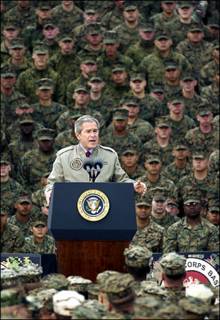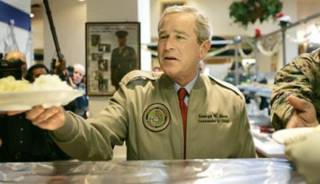The NY TIMES Sees it as I Do
December 30, 2004
EDITORIAL
Are We Stingy? Yes
President Bush finally roused himself yesterday from his vacation in Crawford, Tex., to telephone his sympathy to the leaders of India, Sri Lanka, Thailand and Indonesia, and to speak publicly about the devastation of Sunday's tsunamis in Asia. He also hurried to put as much distance as possible between himself and America's initial measly aid offer of $15 million, and he took issue with an earlier statement by the United Nations' emergency relief coordinator, Jan Egeland, who had called the overall aid efforts by rich Western nations "stingy." "The person who made that statement was very misguided and ill informed," the president said.
We beg to differ. Mr. Egeland was right on target. We hope Secretary of State Colin Powell was privately embarrassed when, two days into a catastrophic disaster that hit 12 of the world's poorer countries and will cost billions of dollars to meliorate, he held a press conference to say that America, the world's richest nation, would contribute $15 million. That's less than half of what Republicans plan to spend on the Bush inaugural festivities.
The American aid figure for the current disaster is now $35 million, and we applaud Mr. Bush's turnaround. But $35 million remains a miserly drop in the bucket, and is in keeping with the pitiful amount of the United States budget that we allocate for nonmilitary foreign aid. According to a poll, most Americans believe the United States spends 24 percent of its budget on aid to poor countries; it actually spends well under a quarter of 1 percent.
Bush administration officials help create that perception gap. Fuming at the charge of stinginess, Mr. Powell pointed to disaster relief and said the United States "has given more aid in the last four years than any other nation or combination of nations in the world." But for development aid, America gave $16.2 billion in 2003; the European Union gave $37.1 billion. In 2002, those numbers were $13.2 billion for America, and $29.9 billion for Europe.
Making things worse, we often pledge more money than we actually deliver. Victims of the earthquake in Bam, Iran, a year ago are still living in tents because aid, including ours, has not materialized in the amounts pledged. And back in 2002, Mr. Bush announced his Millennium Challenge account to give African countries development assistance of up to $5 billion a year, but the account has yet to disperse a single dollar.
Mr. Bush said yesterday that the $35 million we've now pledged "is only the beginning" of the United States' recovery effort. Let's hope that is true, and that this time, our actions will match our promises.
Bravo NY Times for having the balls to speak the truth! And while we're at it, does Colin Powell know no limit to how low he will grovel to Bush, even at this late date? How could he look the world in the eye and get indignant about our pathetic reaction?





